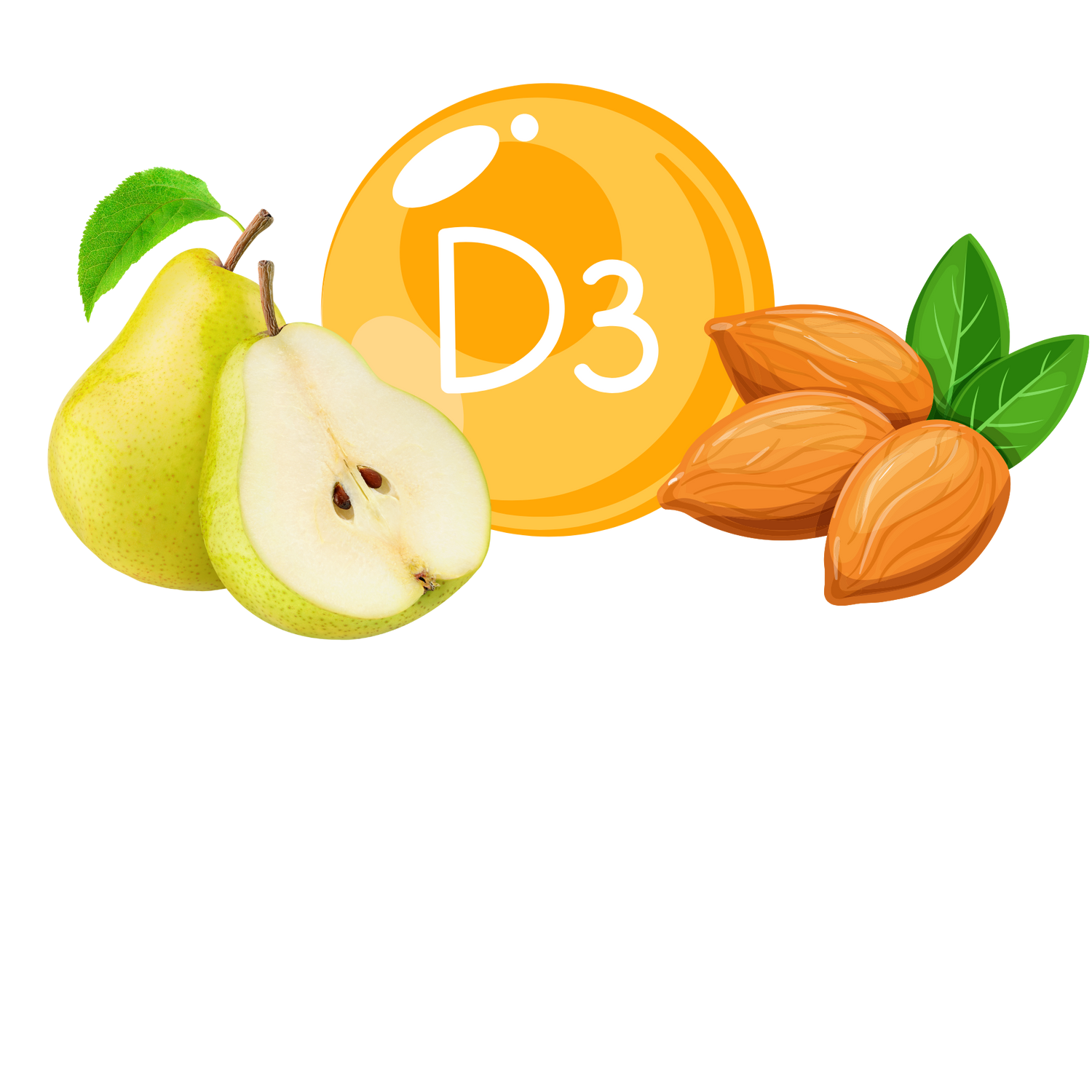
Bone Health, Immunity, and Development
Vegan Vitamin D3
- Supports Bone Health: Vitamin D3 helps with the absorption of calcium and phosphorus, which are crucial for developing strong bones and teeth. For growing kids, adequate Vitamin D is essential to prevent rickets and support overall bone health.
- Boosts Immune System: Vitamin D plays a role in maintaining a healthy immune system. It helps regulate immune responses and can contribute to a lower risk of infections and illnesses.
- Supports Growth and Development :Proper levels of Vitamin D are important for overall growth and development. It supports healthy muscle function and can impact mood and cognitive function.
- Plant-Based Option: Vegan Vitamin D3 is derived from lichen, making it suitable for those following a vegan or vegetarian diet. This is a great alternative to Vitamin D3 sourced from animal products, such as lanolin (derived from sheep's wool).
- Convenient Supplementation: For children who might not get enough Vitamin D from diet alone, especially if they have limited sun exposure, a vegan supplement provides an easy way to ensure they receive the necessary amount. Overall, vegan Vitamin D3 can be an effective and ethical choice for maintaining optimal Vitamin D levels in kids, particularly when combined with a balanced diet and healthy lifestyle.
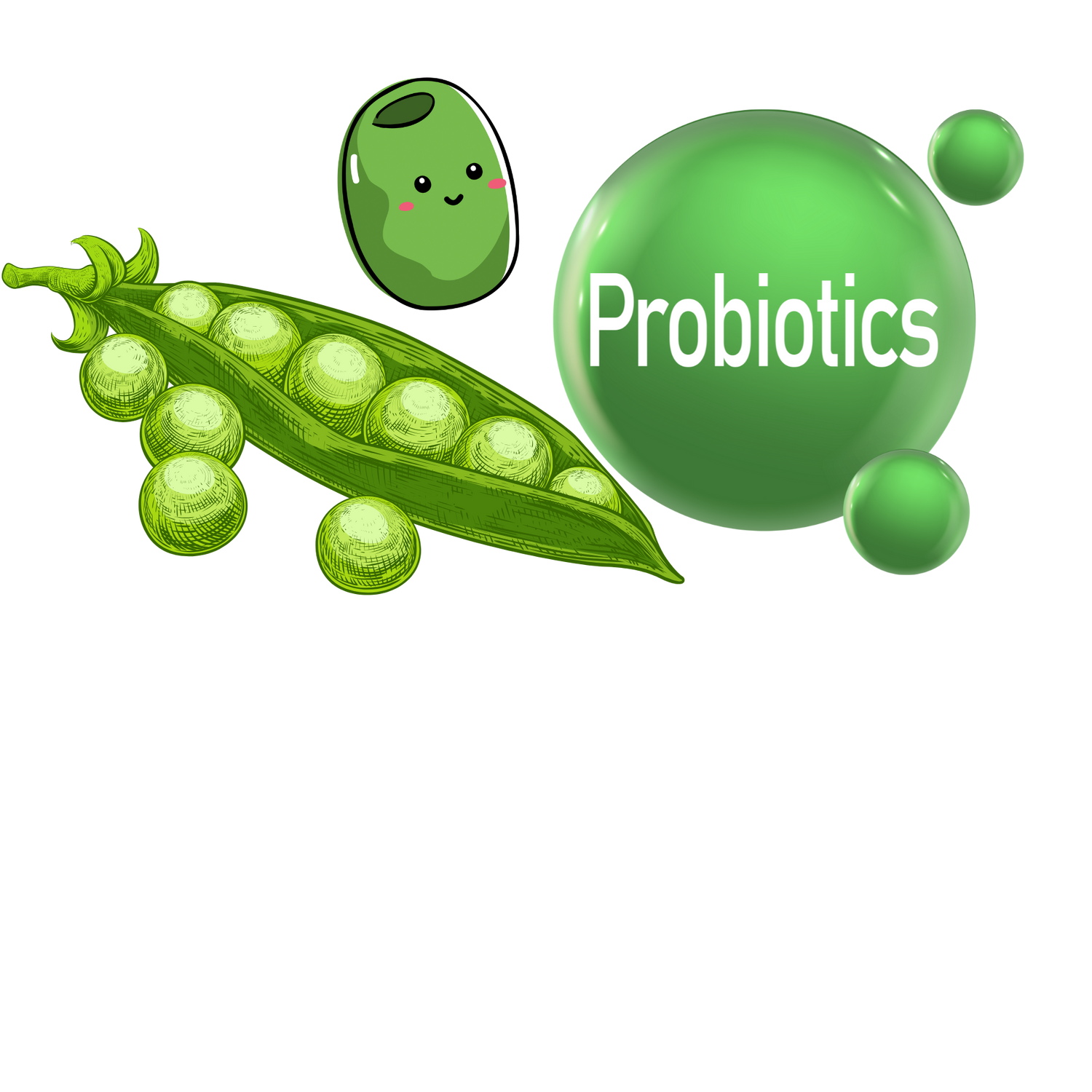
Healthy Gut Bacteria
Vegan Probiotics
1. Digestive Health: Probiotics help maintain a healthy balance of gut bacteria, which can improve digestion and prevent issues like constipation, diarrhea, and bloating. For kids, a healthy gut can contribute to overall comfort and well-being.
2. Supports Immune Function: A well-balanced gut microbiome plays a crucial role in supporting the immune system. Probiotics can help enhance the body’s natural defenses, reducing the frequency and severity of common infections and illnesses.
3. Promotes Nutrient Absorption: Healthy gut flora aids in the absorption of essential nutrients, which is particularly important for growing children who need adequate vitamins and minerals for development.
4. Helps with Food Intolerances: Some children have sensitivities or intolerances to certain foods. Probiotics can help in managing symptoms and improving digestion, which might be beneficial for those with mild food intolerances.
5. Plant-Based Formula: Vegan probiotics are made without animal-derived ingredients, making them suitable for those following a vegan diet. They often use plant-based prebiotics to support probiotic growth and function.
6. Supports Mental Health: There is emerging evidence suggesting that gut health is linked to mental health, often referred to as the “gut-brain axis.” A healthy balance of probiotics may contribute to better mood and mental clarity.
7. Reduced Risk of Allergies: Some studies suggest that probiotics might help in reducing the risk of allergies and asthma in children, although more research is needed in this area. Overall, vegan probiotics can be a beneficial addition to a child’s diet, supporting digestion, immunity, and overall health while aligning with a plant-based lifestyle.
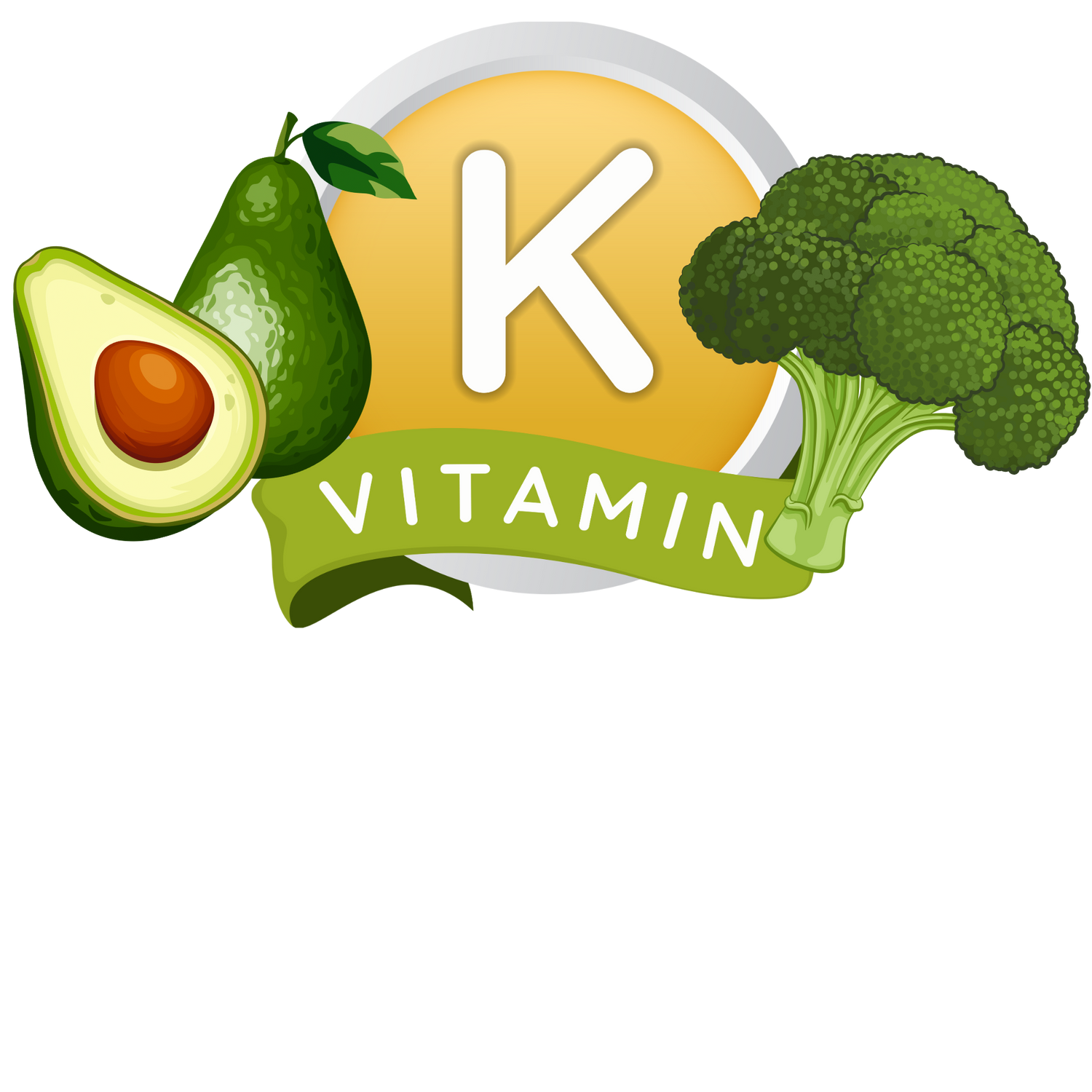
Cognitive Growth and Energy Levels
Vitamin K
1. Bone Health
• Bone Formation: Vitamin K is crucial for the synthesis of osteocalcin, a protein that helps bind calcium to the bone matrix. This supports proper bone mineralization and strength.
• Prevents Bone Disorders: Adequate Vitamin K intake can help prevent bone-related conditions such as osteoporosis and fractures, which are important for growing children.
2. Blood Clotting
• Clotting Factors: Vitamin K is vital for the production of clotting factors in the liver, including Factors II, VII, IX, and X. These are essential for proper blood clotting and help prevent excessive bleeding from injuries.
• Prevent Hemorrhagic Disease: For newborns, Vitamin K is critical in preventing a condition called hemorrhagic disease of the newborn, which can cause excessive bleeding.
3. Cardiovascular Health
• Vascular Health: Vitamin K helps to regulate calcium in the blood vessels and arteries, preventing the buildup of calcium deposits that can lead to cardiovascular problems.
• Supports Heart Function: By maintaining vascular health, Vitamin K indirectly supports overall heart health.
4. Immune Function
• Modulates Immune Responses: Emerging research suggests that Vitamin K plays a role in modulating immune responses, although this role is less well understood compared to its functions in bone and blood health.
5. Cognitive Development
• Brain Health: Some studies suggest that Vitamin K may contribute to brain health and cognitive function, though more research is needed in this area to fully understand its impact.
6. Growth and Development
• Overall Health: Ensuring that children get enough Vitamin K supports their overall health and development, contributing to normal growth and physical development.
Sources of Vitamin K
• Dietary Sources: Vitamin K can be found in foods such as leafy green vegetables (e.g., spinach, kale), broccoli, Brussels sprouts, and certain vegetable oils.
• Supplementation: In some cases, especially for those on restrictive diets or with specific health concerns, supplementation may be considered. However, it’s usually best to obtain vitamins through a balanced diet.
7. Mental Health
• Supports Mental and Emotional Well-Being: Vitamin K may help with mood regulation and cognitive function. For children, a balanced diet typically provides sufficient amounts of this vitamin, but in cases where dietary intake might be insufficient (such as with a vegan diet), supplements might be considered. Always consult with a healthcare provider before starting any new supplement regimen for kids.
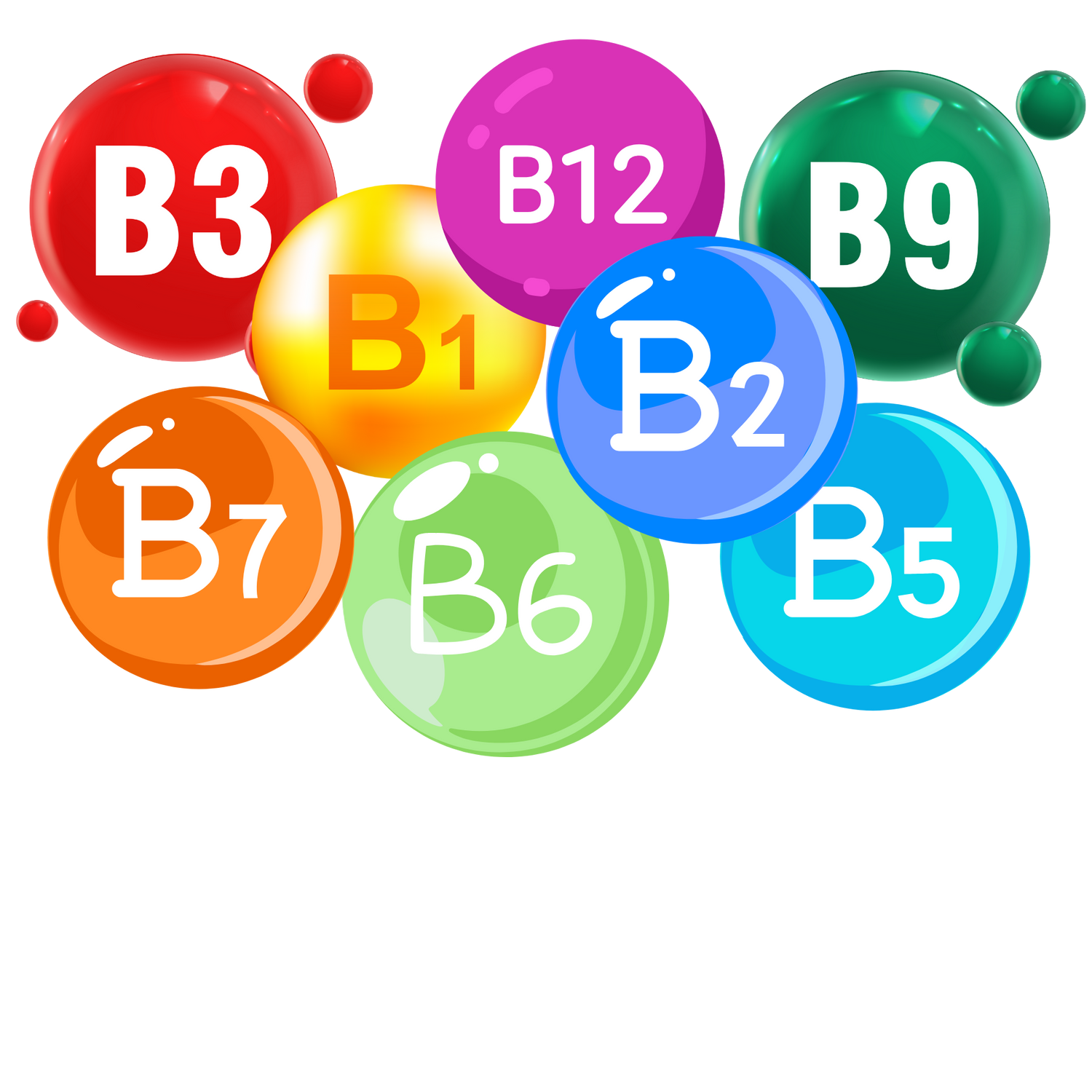
development and health
Essential B Vitamins
Vitamin B1 (Thiamine)
• Energy Production: Helps convert carbohydrates into energy, which is crucial for active children.
• Nervous System Health: Supports proper functioning of the nervous system, helping with nerve signaling and brain function.
• Growth and Development: Important for overall growth and development.
Vitamin B2 (Riboflavin)
• Energy Metabolism: Assists in the metabolism of fats, proteins, and carbohydrates, contributing to energy production.
• Cell Health: Supports healthy skin, eyes, and red blood cells.
• Antioxidant Function: Helps in combating oxidative stress and maintaining overall cellular health.
Vitamin B3 (Niacin)
• Energy Production: Plays a role in the conversion of food into energy.
• Skin Health: Promotes healthy skin and can help manage conditions like eczema.
• Digestive Health: Supports the health of the digestive system.
Vitamin B5 (Pantothenic Acid)
• Energy Metabolism: Essential for synthesizing coenzyme A, which is involved in energy production.
• Synthesis of Hormones: Helps in the production of hormones and cholesterol.
• Wound Healing: Contributes to the healing of wounds and supports overall cellular repair.
Vitamin B6 (Pyridoxine)
• Brain Development: Important for brain development and function.
• Amino Acid Metabolism: Involved in the metabolism of amino acids and neurotransmitters, affecting mood and cognitive functions.
• Immune Function: Supports a healthy immune system.
Vitamin B7 (Biotin)
• Energy Production: Assists in the metabolism of fats, carbohydrates, and proteins.
• Skin and Hair Health: Promotes healthy skin, hair, and nails.
• Growth and Development: Contributes to overall growth and development.
Vitamin B12 (Cobalamin)
• Red Blood Cell Formation: Essential for the formation of red blood cells and preventing anemia.
• Neurological Health: Supports nerve health and cognitive functions.
• DNA Synthesis: Plays a role in DNA synthesis and repair.
Overall Benefits for Kids
• Balanced Diet: Ensures proper growth and development, supporting physical and cognitive growth.
• Energy Levels: Maintains high energy levels, which is important for active children.
• Immune Support: Helps in maintaining a strong immune system, reducing the risk of infections.
For children, a balanced diet typically provides sufficient amounts of these vitamins, but in cases where dietary intake might be insufficient (such as with a vegan diet), supplements might be considered. Always consult with a healthcare provider before starting any new supplement regimen for kids.
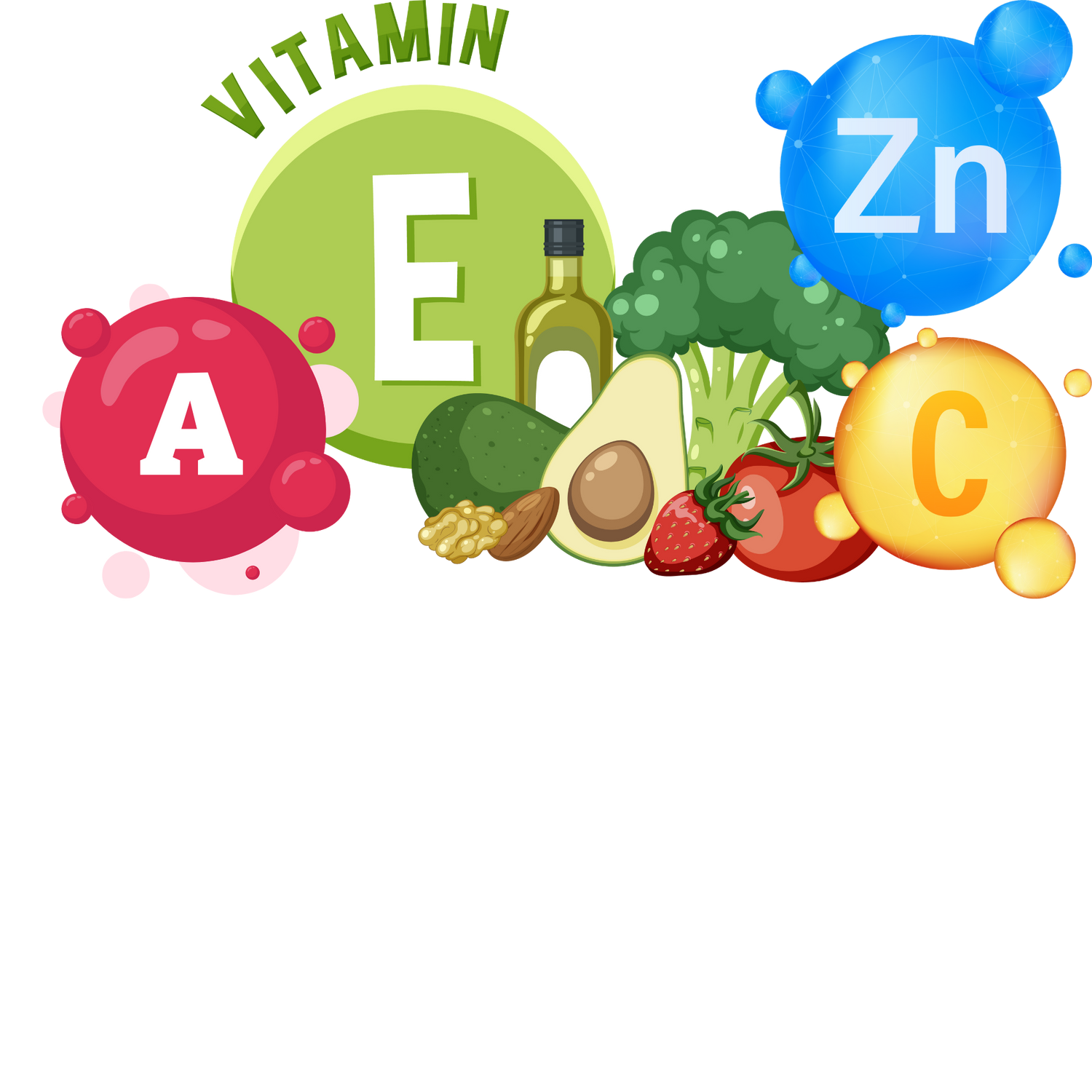
Immune support
Vitamin A, C, E, and Zinc
Vitamin A
• Immune Function: Essential for maintaining the health of mucous membranes, including those in the respiratory and digestive tracts, which act as barriers to infections.
• Vision: Supports healthy vision, particularly in low-light conditions, and is crucial for overall eye health.
• Cell Growth and Differentiation: Plays a role in cell growth and differentiation, which is vital for normal development and functioning of tissues.
• Skin Health: Helps maintain healthy skin, which serves as a first line of defense against pathogens.
Vitamin C
• Antioxidant Protection: Acts as a powerful antioxidant, protecting cells from damage caused by free radicals.
• Immune System Support: Enhances the production and function of white blood cells, which are essential for fighting infections.
• Collagen Production: Supports the production of collagen, which is important for the health of skin, blood vessels, and connective tissues.
• Iron Absorption: Improves the absorption of iron from plant-based foods, helping to prevent anemia.
Vitamin D
• Immune Function: Modulates the immune system by promoting the production of antimicrobial peptides and enhancing the function of immune cells.
• Bone Health: Essential for the absorption of calcium and phosphorus, which are critical for the development of strong and healthy bones and teeth.
• Mood Regulation: Plays a role in mood regulation and may help reduce the risk of mood disorders.
Vitamin E
• Antioxidant Protection: Provides antioxidant protection to cells and tissues, helping to prevent oxidative damage.
• Immune Support: Enhances immune function by improving the production of immune cells and promoting their function.
• Skin Health: Contributes to healthy skin by protecting it from damage caused by free radicals and supporting healing.
Zinc
• Immune Function: Essential for the development and function of immune cells, including T cells and macrophages, which help fight infections.
• Growth and Development: Plays a critical role in normal growth and development, including cell division and protein synthesis.
• Wound Healing: Supports the healing process of wounds and supports the maintenance of healthy skin.
• Taste and Smell: Contributes to the senses of taste and smell, which can influence appetite and overall nutrition.
Overall, these vitamins support metabolic processes that help maintain energy levels and overall vitality. A well-balanced diet usually provides adequate amounts of these nutrients, but in cases where dietary intake might be insufficient or if there are specific health concerns, supplements might be considered. Always consult with a healthcare provider before starting any new supplements for children.
plant-based diet
Vegan vs. Non-vegan
1. Ethical Considerations
Animal Welfare: Vegan multivitamins are free from animal-derived ingredients, which aligns with ethical concerns regarding animal exploitation and welfare.
Environmental Impact: Many people choose vegan products due to concerns about the environmental impact of animal farming.
2. Avoidance of Animal Byproducts
No Gelatin: Vegan multivitamins typically avoid gelatin, which is made from animal bones and connective tissues and is commonly used as a binding agent in supplements.
Vegan Vitamin D: They often use vegan sources of Vitamin D, such as lichen-derived Vitamin D3, rather than Vitamin D3 from lanolin (sheep's wool).
3. Suitable for Plant-Based Diets
Alignment with Diet: They are designed to complement a vegan diet, which can be beneficial for children who are strictly vegan and might have limited access to certain nutrients from plant sources alone.
4. Nutrient Content
Specialized Formulations: Vegan multivitamins are formulated to include nutrients that are often less abundant in a vegan diet, such as Vitamin B12, iron, calcium, and omega-3 fatty acids from algae-based sources.
5. Digestibility and Absorption
Plant-Based Ingredients: Vegan multivitamins may use plant-based forms of nutrients that some people find easier to digest and absorb.
6. No Artificial Additives
Cleaner Ingredients: Many vegan supplements avoid artificial colors, flavors, and preservatives that can be found in some non-vegan multivitamins.
7. Allergen-Free Options
Reduced Allergens: Vegan multivitamins may be less likely to contain common allergens found in animal-derived supplements, like certain dairy products or casein.
8. Support for Vegan Kids' Needs
Balanced Nutrition: They are specifically designed to address the potential nutritional gaps in a vegan diet, helping to ensure that children receive essential vitamins and minerals.
